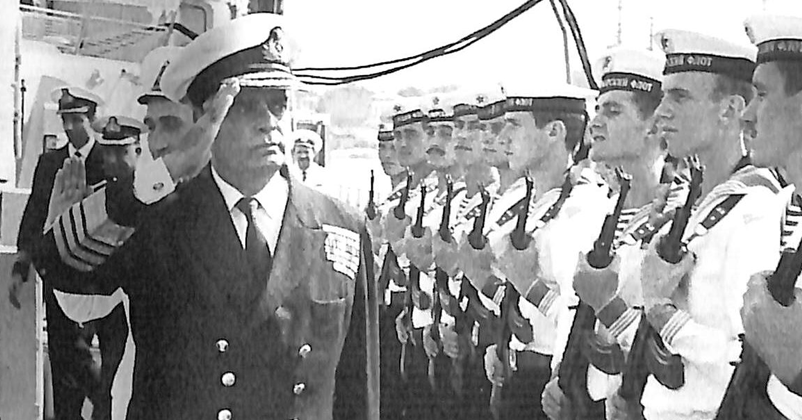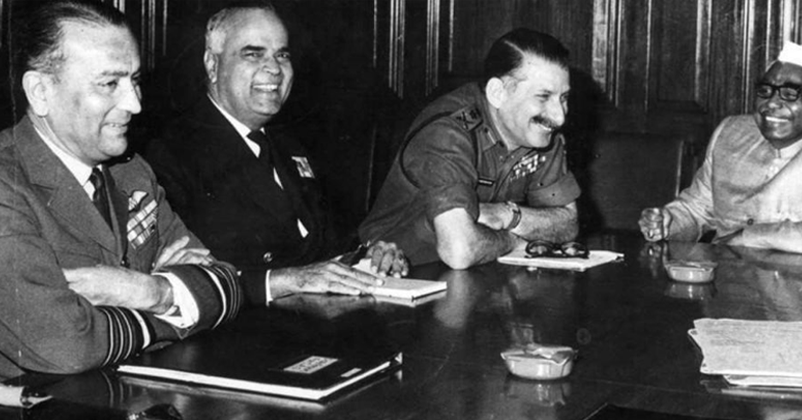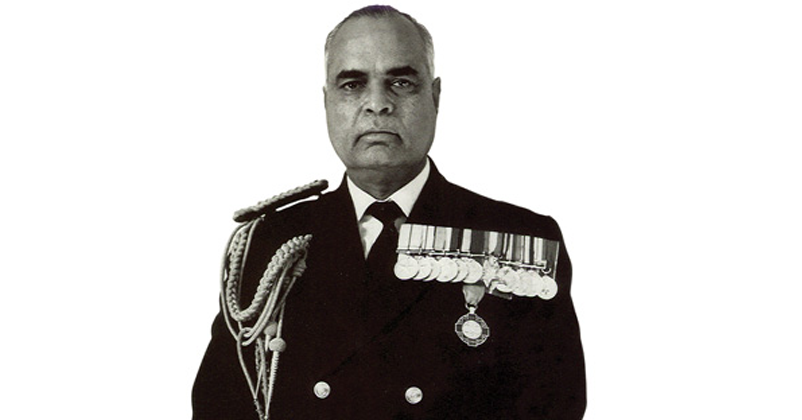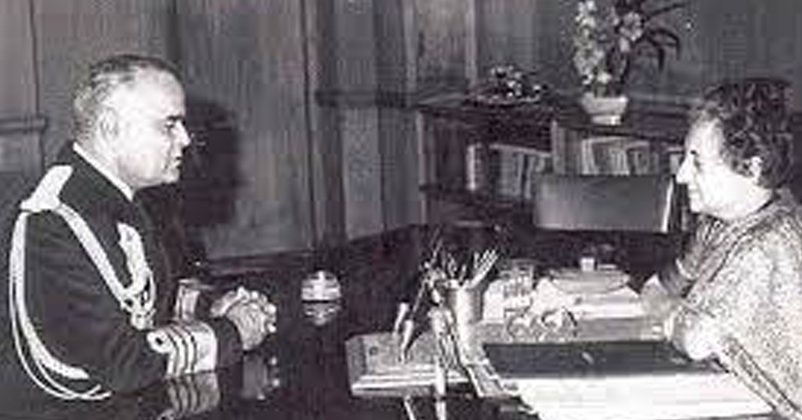Admiral Nanda: The man born in Karachi who planned its bombing in 1971 war
14 Dec 2021 16:42:29

By Sant Kumar Sharma
Jammu, December 14:
In 1965 India-Pakistan war, the Indian Navy was told to stand aside and take no part in the hostilities. The men of Pakistani Army were projected as Ghaznavis, capable of eating alive dal-eating Indians. A Joint Secretary in the Ministry of Defence issued this directive to the Chief of the Naval Staff (CNS), prohibiting the Indian Navy to operate north of Saurashtra Coast. A furious CNS then met Defence Minister and the orders were repeated. Not satisfied, the CNS then went to meet the Prime Minister, who not only repeated the orders but also forbade him from seeing the President, Supreme Commander of the Indian armed forces.
During that war, the Pakistani ships came in and bombarded the sand dunes off Dwarka. Militarily, this had zero value or zilch as some would say. However, psychologically they had scored high and deeply hurt the sentiments of Indians at large and of the Indian Navy in particular. It is rumoured that Pakistan’s intelligence was better than what Indians possessed. Is it possible that Pakistan was aware that the Indian Navy had been forbidden to operate in the northern reaches of the Arabian Sea?
At Bombay (now Mumbai), the Navy mingled with the who’s who of society. But at every party, the Indian Navy became the butt of jokes, some very nasty indeed. The Naval fraternity, both officers and men, were fuming mad and swore that given another opportunity, they would avenge their humiliation. Admiral S M Nanda, the Chief of Naval Staff (CNS) in 1971, was occupying a senior position in 1965 and he seethed at the insinuations hurled at these parties, but could do nothing, except wait for the right moment. As luck would have it, Nanda got a chance to square up and demonstrate what the Indian Navy was capable of, just six years later, in 1971.

Commodore Vijay Jerath, who was in charge of INS Vinash which fired four missiles from his boat on December 8/9, 1971, at Karachi and Kemeri oilfields, writes in the Foreword of his book, 25 MISSILE SQUADRON, THE UNTOLD STORY. He says: Indian Navy is known as the ``silent service’’ and has the motto ``loose lips sink ships’’. Jerath and others had been trained in Vladivostok in the company of Soviet Navy fraternity a couple of years before 1971 war. Once these sailors trained for operating missile boats came back to India, the boats were put out of bounds for all, except those, who formed part of the Missile Squadron.
``After the 1971 war, all of us in the Missile Squadron were of the opinion that these could be used in another operation by the Indian Navy again,’’ Jerath reminisces. This was the prime reason why no stories exist in public domain about Operation Trident and Operation Python Indian Navy had launched with devastating effect. By March 2005, it was time to decommission the last two missile boats. It was then that the Navy decided to invite veterans like us to witness ``Practice Missile Firing (PMF)’’ event off Vishakhapatnam coast, Vijay Jerath writes. The book came to be conceived around that time, 34 years later and was available in print only in 2007, 36 years after the event.
The idea to write this book took shape only after hearing many rumours which insinuated wrongly, that some Navy officers were not up to the tasks assigned to them. Many Indian Navy veterans who had gathered for that March 2005 at Vizag (as Vishakhapatnam is also called) encouraged Jerath to tell the story of the missile boats and the crucial role they had played in devastating Karachi.

In 1971, war clouds were looming on the horizon. During October 1971, Admiral S M Nanda, Chief of the Naval Staff, took an appointment and walked into the office of Prime Minister Indira Gandhi. Briefing her on the Navy’s plans, he specifically asked her if the government would have any objections to the Indian Navy attacking Karachi. After thinking for some time, Indira Gandhi said: ``Well, Admiral, if there is a war, there is a war.’’ The CNS thanked the Prime Minister and walked away.
This was the genesis of the naval attacks on Karachi in West Pakistan and many of its actions in East Pakistan which were carried out when Nanda was the CNS. He had no love lost for Karachi as an ``objective’’ as Sardarilal Mathradas ‘Charles’ Nanda (Nanda’s full name!) was born in Manora in Karachi. Manora was once an island but has connected to Karachi now due to heavy siltation over last many decades. The 12 km between Manora, Nanda’s janambhoomi (place of birth) is now connected by a natural sandbridge which is known as Sandspit. Nanda knew clearly that Karachi was where most of the ships of Pakistan Navy were stationed. Most of mercantile shipping supplies also reached West Pakistan via Karachi which was also Pakistan’s capital for first 20 years till 1967.

For his role in the 1971 war, Nanda was given Padam Vibhushan. After finishing his schooling, Nanda, who was eldest of seven siblings, worked for some time for the Port and Pilotage Department at Manora. He was commissioned in the Royal Navy in 1941 and the ship Cauvery on which he worked in 1947 was assigned to India after the Partition. Nanda was Managing Director of Mazgaon Dock Limited, an assignment he took charge of in December 1964 and handed over this responsibility to his successor in May 1966.
Admiral Nanda wrote a book, THE MAN WHO BOMBED KARACHI, A MEMOIR, a few copies of which are still available on Amazon. Commodore Jerath’s book has not been available in the market for some years now. Some of the stories regarding these exploits are available on YouTube now. See Coomodore Jerath on YouTube at https://www.youtube.com/watch?v=qWChUx9N8g0. Jerath’s book was partly the result of some discussions with Major General (retired) Ian Cordozo who wrote a book on sinking of INS Khukhri, the naval ship that India lost in 1971 war. The bravery and exploits of Cordozo, of Gorkha Rifles, who himself chopped off his leg with own khukhri when he got injured in East Pakistan during an operation is another story worth recounting.
After getting injured, Cordozo wanted his leg cut off so that gangrene did not set in and he could continue to command his troops. He is perhaps the first amputee officer from the Indian Army to command a battalion. He was called ``Cartoos Saheb’’ by the Gorkha troops he commanded as they had difficulty in pronouncing Cordozo!